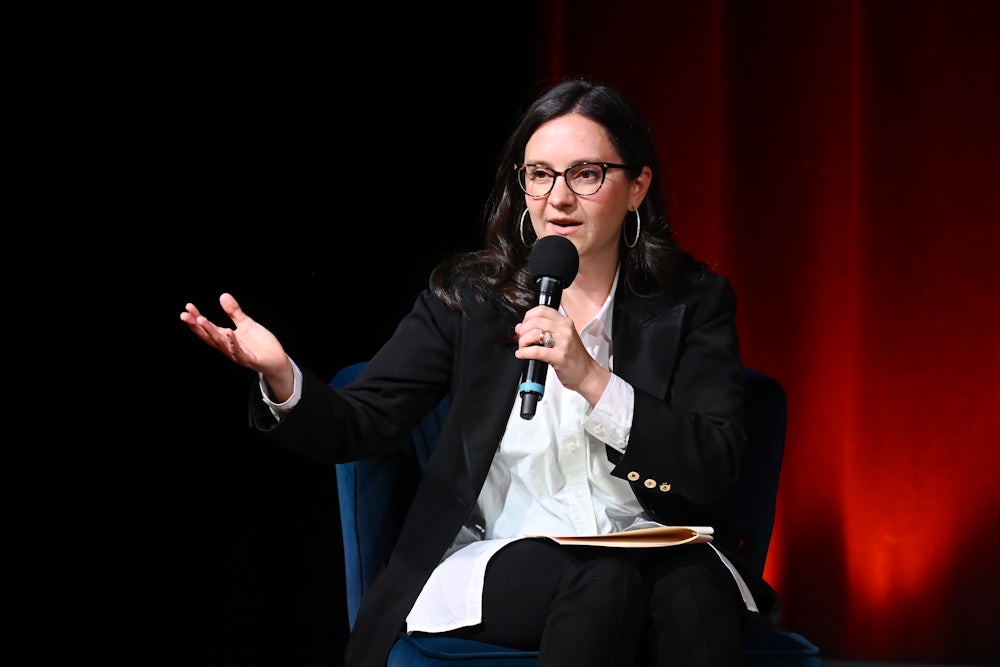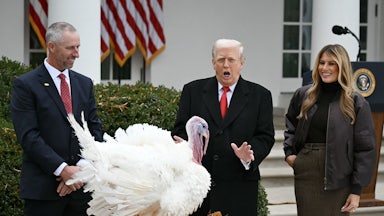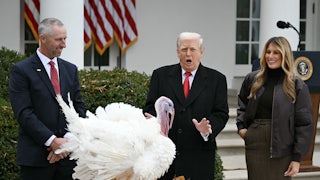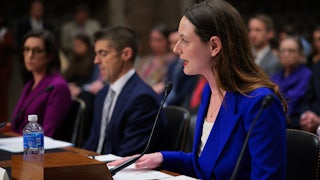Over the course of her decade-long career in media, Bari Weiss has really only told one story. Sure, she and The Free Press, the website she founded after publicly resigning from The New York Times in the summer of 2020, have covered a number of subjects: college campuses (too woke), trans people (too publicly accepted), Democrats (also too woke), Israel (too often the subject of free speech), and free speech (under attack from all sides). But Weiss’s big overarching narrative has always been about the media: that it is rotting from within due to the “new orthodoxy” of social justice. “Intellectual curiosity—let alone risk-taking,” Weiss wrote in her 2020 explanation of why she was resigning from the Times, “is now a liability.”
At the time, the paper was regularly publishing columns by David Brooks and Brett Stephens, while its reporters often seemed to bend over backward to accommodate voices from an increasingly extreme Republican Party. But it hardly mattered. Weiss, despite producing a body of work that was frequently shoddy, reductive, and shallow—with rarely even a whiff of forbidden truth—consistently cast herself as one of the brave few willing to confront the “woke” mob and their pitchforks. This approach has proven lucrative. She gave the magazine she founded after leaving the Times what may be the least subtle name in media history—The Free Press—and built it in her image. Provocative, profoundly incurious, grindingly repetitive, it was, almost from its inception, a huge success. Earlier this year, she sold it to CBS for $150 million in a deal that made her the new editor in chief of CBS News, one of America’s most influential mainstream institutions.
Now, Bari Weiss has real power. She’s using it to push a tepid, dull format that wore out its welcome years ago.
There is, to be clear, a sinister element to Weiss’s presence at CBS News. She is at CBS to root out “wokeness”—not that anyone ever seems certain what this word means—and ensure that the network never again finds itself on the receiving end of a frivolous lawsuit from Donald Trump. Respected journalists have been pushed out, while Weiss waffles between hiring the doofus conservative pundit from CNN or one of Fox News’s interchangeable stooge “journalists.” She is currently running one of the most storied—and best—journalistic institutions into the ground.
I assume she’s doing so for ideological reasons. But, watching a three-minute clip of Weiss discussing her purview at the network at Sunday’s Jewish Leadership Conference, it occurred to me that something else is also going on: Weiss understands the media like a TV pundit. That is hardly surprising, but is nevertheless very funny because she is a terrible media pundit.
Bari Weiss says she wants to use her new perch at CBS News to “redraw the lines of what falls in the 40 yards of acceptable debate” in American political and cultural life. She says the aim is to sideline voices like Hasan Piker, Tucker Carlson and Nick Fuentes, and elevate… pic.twitter.com/hfbM4gOwcN
— Drop Site (@DropSiteNews) November 25, 2025
It’s worth watching the four-minute clip mainly for one reason: The full video is somehow even more embarrassing than the text suggests. It is, without a doubt, one of the single goofiest things about the media that I have ever encountered.
For Weiss, the decline of the American media is best exemplified by the rise of Nick Fuentes (a Nazi), Andrew Tate (a virulent misogynist), and Hasan Piker (a leftist streamer who pushes universal health care while playing video games). For what it’s worth, she is sitting next to Ben Shapiro while she says all of this. None of these people, it should be no noted, regularly appear on CBS—or any other mainstream network.
“Those people don’t actually represent our values, and they don’t think that they represent the values or the worldview of the vast majority of Americans,” Weiss says, growing more passionate. “This is an opportunity to speak for the 75 percent, for the people on the center-left and the center-right that still believe in equality of opportunity, that still believe passionately in the American project, that still believe in all of the things that everyone in this room believes in: liberty and freedom and individual responsibility and, on a basic level, the right to know what is exactly going on in the world. Not the world as propagandists and ideologues imagine it to be, but what’s actually going on in the world.”
You wouldn’t know from this that there is a media ecosystem that exists outside of a handful of streamers. In fact, there actually is a media that, you know, speaks to people in the middle and aims to tell you exactly what’s going on in the world: It’s called CBS News. It existed long before Bari Weiss was put in charge.
Still, Weiss insists that she and CBS are “getting back to” that way of doing things. How will she do that? First, Weiss says that “centrist news” operations have failed because they all feel like “force-feeding spinach down someone’s throat.” She then acknowledges that there’s no going back to the days of Walter Cronkite when one anchor could be trusted for tens of millions. No, Weiss has a different plan.
I don’t think that it’s about pretending that you can go back to the view from nowhere, it’s about who’s in the room. It’s about redrawing the lines of what falls in … acceptable debate and acceptable American politics and culture. I don’t mean that in a censorious, gatekeeping way. I mean that about having people who are clearly on the center-left and on the center-right in conversation with each other.
The example of a “center-left” and “center-right” discussion she cites? That’s right, it’s a Free Press–sponsored debate over gun control between former NRA head Dana Loesch and nightmare Thanksgiving guest Alan Dershowitz.
What Weiss really wants is to have the power to unilaterally—or perhaps with the input of the Ellisons—determine what is “acceptable” in American politics and culture. The invocation of Loesch (a lobbyist who advocates for unrestricted access to firearms) and Dershowitz (a member of Jeffrey Epstein’s defense team) only makes it more ridiculous. These are bad people to hold up as paragons of the “acceptable”—and, regardless, both of them are already on television a lot.
That leads to another problem that has nothing to do with principle: All Bari Weiss is doing in this excerpt is inventing cable news. She’s describing Crossfire. Cable news is built on the premise that it is a stage for people of rival beliefs and parties to shout at one another. Weiss is pleased that the participants in her Free Press debates “like each other” after their arguments, but that’s actually what a lot of people hate about cable news: that the pundits who shout at each other on TV drink cocktails together afterward. It’s hard to think of anything that reinforces the media’s clubby, elitist image more. In any case, if the choice is between Alan Dershowitz and Dana Loesch talking about gun control and watching a Twitch stream—literally any Twitch stream—I’ll watch someone else play video games. Weiss can stack as many platitudes on top of each other as she wants, but her vision for CBS News is “CNN, but somehow worse.”
It’s easy to see how Weiss ended up here. For one thing, she’s a pundit who has no real interest in understanding the subjects she opines about. She’s built her entire career accusing mainstream outlets, most notably The New York Times, of being left-wing sleeper cells. Now that she’s been put in charge of a comparable institution, her “vision” is to run something fourth-rate and hackish and that, it goes without saying, pales in comparison to the work being done in the office she stormed out of in 2020, claiming that her colleagues were trying to silence her.
Ironically, Weiss’s version of CBS wouldn’t just be worse, it would also appear to be significantly more restrictive. The big difference, after all, is that she won’t let anyone say anything bad about Israel. Weiss is putting people on notice that CBS News is growing more restrictive and less journalistically rigorous under her leadership. It’s also getting shallower and worse, which is to say, more like its new editor in chief.








